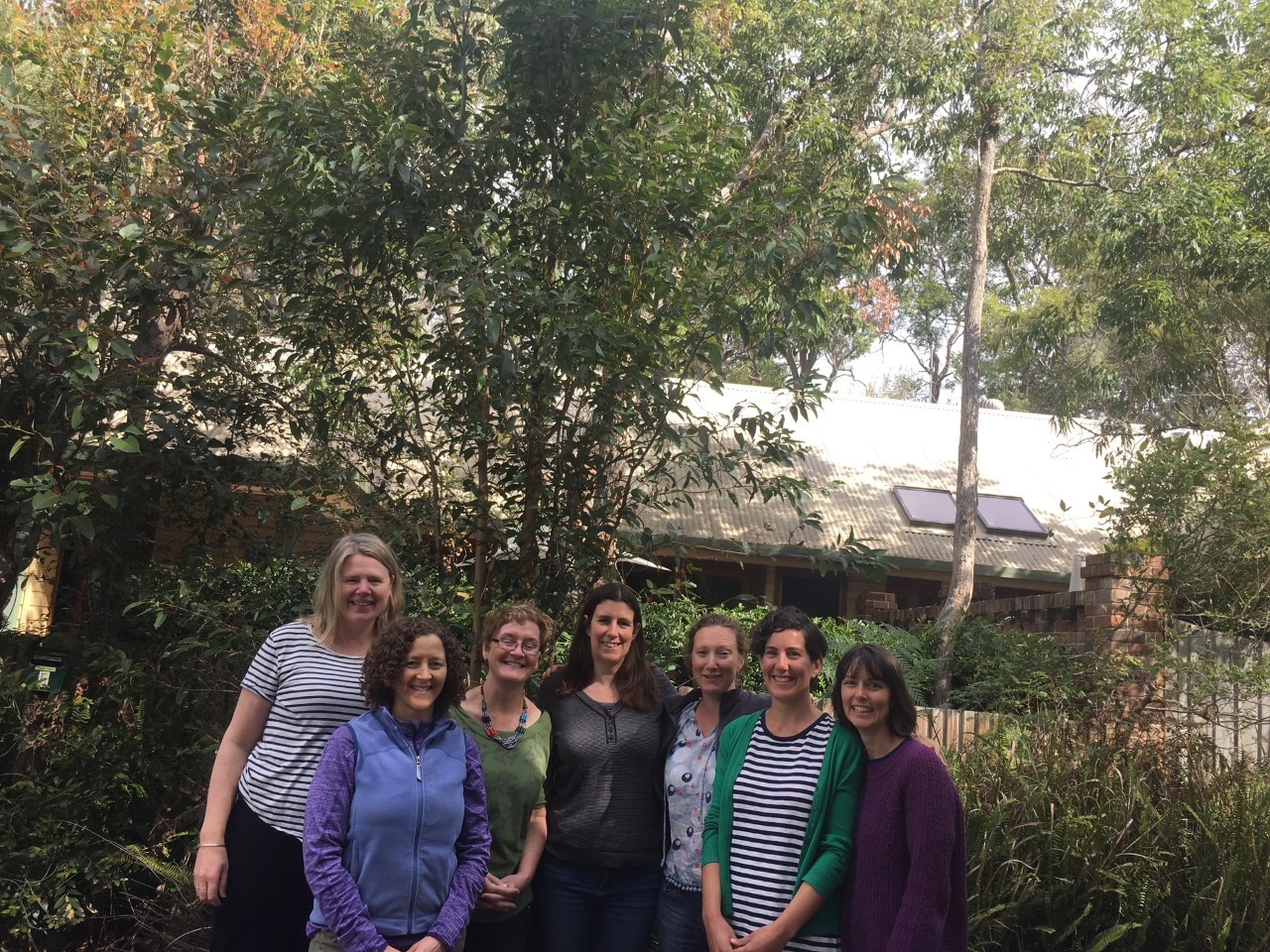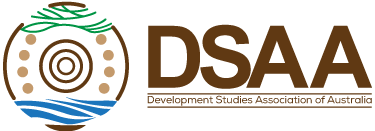A new feature of the DSAA newsletter and blog, ‘HDRs in Development’ showcases the research of HDRs students and their supervisors. We’d love to profile your research! Please email lauren.tynan@hdr.mq.edu.au. We begin this new feature by chatting with Lauren Tynan and Associate Professor Fiona Miller.
Lauren Tynan [LT] is a Trawlwulwuy woman from tebrakunna country. She is undertaking a PhD in Geography and Planning at Macquarie University
Associate Professor Fiona Miller [FM] is her supervisor, and is located within the Discipline of Geography and Planning, Faculty of Arts, Macquarie University.

‘Women who write’ retreat, 2018. L-R Fiona Miller, Jen Ruskin, Michelle Duffy, Rebecca Bilous, Kate Lloyd, Lauren Tynan, Michelle Bishop
What’s your research area?
[LT] My PhD focuses on Aboriginal cultural burning practices in south eastern Australia. However, my research area is more generally about relationality and Indigenous research methodologies. I am also interested in what Development Studies looks like in Australia, where it is taught and experienced on stolen Indigenous land.
[FM] I conduct research from a political ecology perspective on the equity dimensions of society-nature relations, with a particular focus on water, climate change adaptation and climate-related displacement. I work in so-called Australia as well as Vietnam.
How did you come to know each other?
[LT] Fiona and I met on a women’s writing retreat some years ago. I was very fortunate to spend a few days getting to know Fiona as a colleague, sharing cups of tea and writing inspiration as we cooked dinner together. When I needed a supervision team for my PhD, I reached out and am very lucky to have her as my Principal Supervisor.
[FM] We met each other at a writing retreat in 2018. Kate Lloyd, who is also part of Lauren’s supervisory team (together with Sandie Suchet-Pearson) met Lauren at the “Pedagogy in Practice” conference in Perth in 2018. Kate and others were inspired by discussions of writing retreats at the conference and organised the retreat where Lauren and I met. In between writing, we chatted, told stories, shared meals, cups of tea and went for walks. Lauren and Michelle also introduced me to weaving.
What do you admire about each other’s work?
[LT] I love the way that Fiona is deeply reflective, political and theoretical about her work. I admire the way she grapples with the uncertainties and ethics of research. I particularly see this in her development research where she always considers her research as a whole, where the wellbeing and strong futures of her collaborators and participants is more important than any academic outputs.
[FM] Lauren constantly amazes and inspires me. With each conversation or read of her writing I find my perspective on taken-for-granted matters shifts. Lauren is a truly innovative thinker, bringing a care, sensitivity and sense of ethics to her research and the relations with Country that underpins her work.
What have you learnt from each other?
[LT] Fiona has taught me to challenge myself and be comfortable in the uncomfortable. She’s really encouraged me to research in areas that I was unfamiliar (and sometimes disinterested!) in, and I am now learning how important it is to really stretch myself as a researcher and be able to speak across various aspects of my research area.
[FM] I have learnt so much from Lauren in terms of her joyful, careful, respectful and ethical approach to research. Read her beautiful paper Thesis as kin to appreciate the way Lauren embraces research and writing as kin.
How do you approach the student-supervisor relationship?
[LT] First and foremost, I am aware that they are not just my supervisors, but teachers, researchers, parents and partners – I try to respect that. I also like to take the lead on organising our meetings and giving us enough time to really unpack ideas. I am also learning how to be more open to critical feedback.
[FM] I try to work with the learning style of each student and try to not be too heavy-handed, working with where they are and their changing needs and priorities. I try to ask questions that encourage reflection and inquiry, so that students learn to trust their own knowledge and experience. I also try to share practical skills that can help students manage the demands of a PhD.
If you were to supervise, what would you emulate?
[LT] I would emulate the way Fiona goes slow and really listens to me as a student, alongside her passion for the topic, always asking me the hard questions and encouraging me to tackle them. I would also emulate the advocacy role that Fiona takes on, always placing importance on the wellbeing of her students and taking their concerns to the highest levels of the university.
If you were to advise a future student, what would you point to about your current student?
[FM] Start where you are with the relations to humans and non-humans that are important to you. Trust in yourself and the value of reflection. Be humble and open to learning opportunities, however and wherever they arise.
What change do you want to see for the future?
[LT] Because my personal passion and academic interest is in Aboriginal fire practices and caring for Country, I want to see Country being respected and healthy. Only then will Indigenous communities across this land now known as Australia, also be respected and healthy.
[FM] A rapid and just transition to a future predicated on an end to extractivist, colonial and violent institutions, ideologies and practices…soon please!
